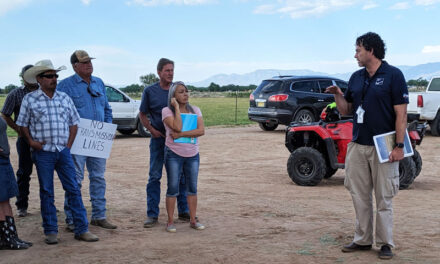After nearly a year of repeatedly renewed and extended public health orders from Gov. Michelle Lujan Grisham, some lawmakers feel the executive powers granted a governor during a public health emergency need to be tempered.
During the 2021 session, legislators plan to look at an update to the Public Health Emergency Response Act, which states the executive (governor) “may issue an enhanced public health advisory if the governor has reasonable cause to believe that a public health emergency may occur.”
The concern about one branch of government exercising autocratic powers without any checks and balances from the Legislature has been brought up in past sessions, but in the era of COVID-19 and the governor’s public health orders have been seen as overreaching.
The governor’s orders have forced school and business closures, cancelled medical procedures and examinations, banned mass gatherings, mandated people to wear masks and self-quarantine and more.
The updated bill would give a more even balance of power between the executive and legislative branches.
Sen. Liz Stefanics (D-District 39) said she has told her constituents she doesn’t believe the governor’s authority should be curbed during a pandemic.
“I do believe there should be a legislative advisory committee that the governor works with as any public health emergencies are declared and orders are decided,” Stefanics said. “I don’t want the Legislature to get in the way of doing what’s necessary but I do want them to work with and know in advance of what’s going to happen.
“The more minds you put to a problem, the more solutions you’ll have available.”
Stefanics knows it’s a difficult time, and does support the governor. She also recognizes how hard it’s been for businesses and individuals.
“That’s why we’ve been working on getting businesses loans and grants,” she said. “I know loans aren’t the most popular thing, but we’re working on grants to give out to businesses and individuals. I understand it’s horrible right now.”
Rep. Kelly Fajardo (R-District 7) said there is bipartisan support to suspend the governor’s emergency powers and amend the act.
“Right now, she’s just renewing (the health order) constantly,” Fajardo said. “(The bill) would require the governor to seek legislative approval before she could enact her emergency health orders.”
Fajardo said the governor’s actions have hurt businesses and individuals across the state, and she doesn’t understand the ramifications of her decisions.
“The governor lives in her mansion and she hasn’t left,” Fajardo said. “She doesn’t buy her own groceries and she doesn’t have children in school.
“She has a full team around her, and she has people come into her house to clean. I would argue that she’s a little bit disconnected, and because of that, she doesn’t see what’s going on.”
Fajardo said one of the most extreme decisions the Lujan Grisham did was limit the amount of people in big box stores, causing what she described as “breadlines.”
Rep. Alonzo Baldonado (R-District 8) is also signing on to the legislation that will curb the governor’s executive powers.
“There is a definite need for more than just one person to be making all these decisions,” Baldonado said.
Rep. Matthew McQueen (D-District 50) said the governor has done a good job in a difficult situation.
“I will look at any legislation, but initial reports seemed to be a proposal to grant the Legislature oversight authority that we already have,” he said.
Rep. Harry Garica (D-District 69) said he couldn’t answer whether he supported the legislation.
“The governor has done a good job and, of course, there’s people that are upset. Businesses are hurting,” Garcia said. “Truthfully, if she is saving lives, that’s good, and I’m not going to comment if I think she has overdone her executive power because nobody was ready for this pandemic.”
Checks and balances need to be incorporated to the governor’s existing authority, said Sen. Joshua Sanchez (R-District 30).
“We are seeing an increase in the suicide rate. People are people and have got to get out and connect with other people,” he said. “This is affecting everybody — our small businesses, moms staying home and teaching when they aren’t teachers. People have asked me, ‘How do I put a roof over my head? Do I teach my kids or do I go to work? What do we do?’”
Sen. Greg Baca (R-District 29), the senate minority leader, has introduced a bill that would provide for automatic termination of a public health emergency order or a public health order that closes public places or limits gatherings.
“It requires legislative approval for the governor to extend an order past 14 days or to amend it,” Baca said.
Senate Bill 74 calls for any public health order that closes any public place or forbids or limits gatherings be sent to the president pro tempore and minority floor leader of the Senate and the speaker and minority floor leader of the House.
Orders of this kind would automatically expire in 14 days, and could not be renewed or amended or a new order issued for the same subject except by a joint resolution of the Legislature.
If the Legislature is not in session when the order ends, three of the four leadership positions must sign a joint statement to extend or amend the order or to issue a new one.
An executive order declaring a state of public health emergency shall include whether the emergency is expected to last longer than 14 days, according to the proposed bill.
Once an executive order is issued, it will be sent to the president pro tempore and minority floor leader of the Senate and the speaker and minority flood leader of the House. An executive order would also expire automatically in 14 days, unless revisited by the Legislature, or again, three of the four leadership positions agreeing to have the order continue.
Legalizing recreational marijuana
For the third time, legislation legalizing recreational marijuana in New Mexico has been introduced to the state Legislature.
Last year, the Senate Judiciary Committee voted 6-4 to table the bill, blocking it from advancing. Gov. Lujan Grisham said she would sign the bill into law if legislators pass it.
Stefanics has long supported legalizing recreational cannabis.
“Yes, I support it, and I’m going to vote for it,” Stefanics said. “I think the arguments are going to be in the fine tuning (of the bill). For example, is it going to be mandatory across the state or will it allow counties and cities to opt out?”
Stefanics is also asking if there will be standardized regulations for growing quality product, and if there will be financial incentives, and will there be funding for public safety in terms of training. She also wants the legislation to address impairment while driving, behavior and addiction problems.
“I do think legalizing marijuana or cannabis could really cut down on an illegal trade movement around the product,” she said.
“Where the revenues will go will be a debate as well. It could go to education, and of course it could go directly into the general fund and be distributed to all programs helping people,” she said. “To say we don’t want money to go into the economic development isn’t fair because they’re the ones giving grants to small communities and businesses to be successful.
“Everything we do, hopefully, in state government is helpful to the people of the state,” she said. “I might lean toward putting money into the general fund, and other people are going to have ideas to put it into our roads and education. We’ll just have to debate it.”
Fajardo, on the other hand, said she isn’t taking a stand on the issue, although she doesn’t see a huge financial benefit from legalizing recreational marijuana.
“I think it will be a small increase in revenue, but not a huge financial increase in the budget like they’re predicting,” Fajardo said.
The Valencia County representative says any revenues from recreational marijuana should be earmarked for education and criminal justice reform.
With proper safeguards in place to address impaired driving, workplace safety, and underage use, McQueen said he would support legalizing recreational cannabis.
Baldonado said he personally didn’t advocate for or against it, but felt legalization was “sort of inevitable.”
“I do think, at this point, it’s a very heavy lift. It leeches into many different parts of government and there are a lot of different moving parts,” Baldonado said. “I’ve always been frustrated with the nonchalant attitude of people towards this bill. I want to have two or three committee hearings on it. I will say you miss a step doing things virtually. I would prefer to see a longer, more focused conversation.”
Rep. Gail Armstrong (R-District 49) said she would be willing to vote for a recreational cannabis bill if law enforcement agreed it could be managed.
“I’m all for creating a new revenue stream, but I don’t want people to be able to grow it themselves,” she said. “We have got to diversify. If this will help do it, there needs to be safety measures for it and employers. The devil is in the details but I’m in favor of it.”
Baca said his main concern about recreational marijuana was the inability to test for it on the road.
“There is not a viable test right now. The safety issue is my primary concern,” Baca said. “People tout what it could bring in in taxes, but I think we need to look at other places, like Colorado, because they’ve had some issues and things haven’t been quite as good as they thought they would be.”
The senator said New Mexico has so many opportunities to build its economy in many areas — referring to recreational marijuana as the “lowest common denominator” — such as manufacturing and technology.
“These are basic things other states have proven to be profitable,” Baca said. “This isn’t a Republican versus Democrat situation. You’ll see support and opposition from both sides.
“I would add we already have a very robust medical marijuana program in the state. You can get what you need; it is a very open and liberal program that is not hard to be involved in which serves the need of the state rather than expanding into recreational use.”
The Valencia County News-Bulletin is a locally owned and operated community newspaper, dedicated to serving Valencia County since 1910 through the highest journalistic and professional business standards. The VCNB is published weekly on Thursdays, including holidays both in print and online.

















